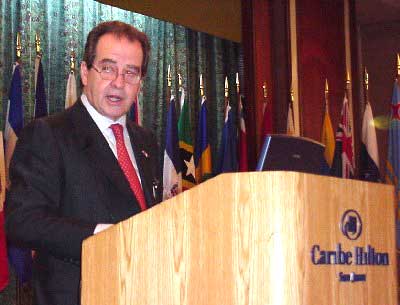ECLAC Calls On Governments to Implement Active Policies for Economic and Social Development
Thirtieth Session. 28 June, 2004

As its Thirtieth Session began, the Economic Commission for Latin America and the Caribbean (ECLAC) presented the report Productive Development in Open Economies, which will serve as the basis for discussion by the delegates attending the meeting.
The report, prepared by this regional United Nations commission, offers recommendations on social and economic policies to member and associate states for the coming years.
In the report ECLAC calls on governments to implement active policies to encourage economic and social development, which are able to overcome both market and governmental flaws.
ECLAC adds that it has become necessary to replace the vision that has guided the region's economic reforms in the past twenty years, summarized in the concept "more market and less State", with one that focuses on "markets that work well and better quality government."
In its analysis of this period, in which the region made integration into the global economy a high priority, ECLAC notes that this brought some very important achievements, but there are still lags and issues pending. In particular, the strategy used in the region has not generated enough growth to reduce poverty and marginality. "The region must build upon the progress it has already made, but it also has to close existing gaps and address unresolved issues," the report states.
Thus a "road map" is proposed to articulate public policies in different spheres, taking into consideration the major differences among ECLAC's member countries and the need to respect their unique characteristics.
Along with proposing a more active role for the State, this proposal includes the need to achieve a new balance between private initiatives and public interest, paying special attention to equality of opportunities and social cohesion. To do so, governments must give priority to achieving greater tolerance of differences within their societies and a greater willingness to compromise.
According to Productive Development in Open Economies, the region's efforts should focus on building an inclusive future. "Today, the situation is different and requires a mobilization of social energies around a common endeavour, in order to establish long-term agreements (explicit or implicit) between the State and political and social actors regarding objectives, and the set of policies and innovations needed to achieve them," the document states.
Similarly, in the international sphere a series of asymmetries characterize the relationship between developed and developing countries. Nor do countries offer true equality of opportunities internally. This would allow informal companies, formal medium-sized and small firms to function similarly, be these domestic or foreign. To avoid these inequalities, active public policies that aim to level the playing field through specific actions to remove obstacles that affect each productive unit differently must be applied.
In this context, three types of public strategies arise: those involving inclusion, which aim to move small firms from the informal to the formal sector of the economy, wherever possible; modernization, which focuses on specific production chains or clusters; and "densification", which aims to introduce more knowledge into the country's productive system, as well as establishing a better linked network of productive, technological, business and labour relations.
ECLAC adds that adopting these differentiated strategies requires a considerable increase in the transparency of public policies. At the same time, it is necessary to put into practice monitoring and evaluating mechanisms, that make it possible to learn from successes and failures.
Moreover, the document indicates that in open economies, policy instruments must of necessity be more gradual.
On one hand, international rules, free trade treaties and several regional agreements restrict the use of many normal instruments from the past. On the other, budgetary and financial restrictions make it necessary to select those to be applied more carefully. All this requires focusing efforts, increasing their efficiency, and above all finding new ways of applying public policies.
Finally, the United Nations body underlines that economic growth is both a condition for and a consequence of all the above. However, this seems a difficult task to achieve without making major efforts to boost domestic saving and put more investment into production. In fact, one of the factors that have most disturbed the region's countries economic decisions in recent years has been the great variety and volatility of international financing.
"Thus, it would be wise to rely more on countries' own strengths, rather than depending exclusively on those of countries outside the region," the ECLAC document concludes.
Related content
Country(ies)
- Latin America and the Caribbean
Related project(s)
Contact
Public Information Unit
- prensa@cepal.org
- (56 2) 2210 2040
